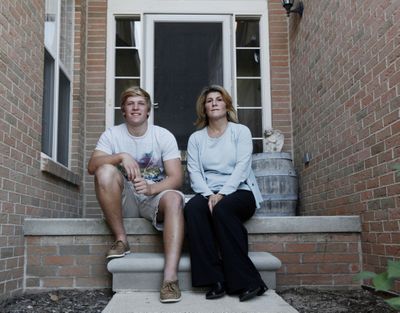Keeping up house payments thwarts college plans, savings

NEW YORK – The focus of the housing crisis has largely been on Americans who are losing their homes. But millions of homeowners are making sacrifices in other parts of their lives to keep from defaulting on a mortgage that exceeds the value of their homes.
Some would call them lucky because there’s still a roof over their heads. But their sacrifices – job opportunities, compromised college choices, savings and everyday niceties – hurt their longer-term financial stability and the strength of the economic recovery.
The Obama administration last week launched a program that encourages lenders to offer these “underwater” borrowers a refinanced loan backed by the government. The new terms will forgive at least 10 percent of the original loan amount. Officials expect the program to help between 500,000 and 1.5 million homeowners.
That’s only a sliver of the overall problem, though.
Almost 15 million homeowners were underwater on their mortgage at the end of the first quarter, according to Moody’s Economy.com. And that number is only expected to rise because home prices have yet to stabilize.
For those who bought at the peak of the housing market, like Wade and Cheryl Woolley in Chicago, they will owe more than the value of their home for another five to seven years, according to Moody’s forecast.
“We’re tethered to our house like a sharecropper,” said Wade Woolley, 39, who bought his Chicago condominium in August 2006 for $228,000.
Indeed the condo dashed their plans to relocate. Earlier this year, Cheryl, 45, had to give up a higher-paying position as a visual merchandiser in Atlanta because their bank wouldn’t okay a $160,000 short sale of their Chicago condo. A short sale is when a lender lets a borrower sell their property for less than the amount owed on the mortgage. The bank said the short sale amount had to be at least $190,000.
Unable to afford both a mortgage and rent, the couple moved back to the Chicago condo after a year in Atlanta. Cheryl got a sales position with the same company and Wade went back to work as a paralegal at his former law firm. Both took pay cuts of about 10 percent.
The Woolley’s experience isn’t unique. Workforce mobility is at the slowest rate since World War II, according to a study by Brookings Institute demographer William H. Frey. And that’s a drag on the economy because people are less able to move to find jobs.
Consumer spending, which makes up 70 percent of total economic growth, is also taking a hit. It will continue to suffer if a large number of people feel weighed down by their underwater mortgages.
For instance, the Woolley’s decided against replacing their 85-year-old windows with energy efficient ones because they don’t want to pour any more money into a sinkhole.
“It is really just one of a number of home improvement projects that we may never do,” Cheryl said. “It’s difficult to justify such expenditures when you’re as upside-down as we are.”